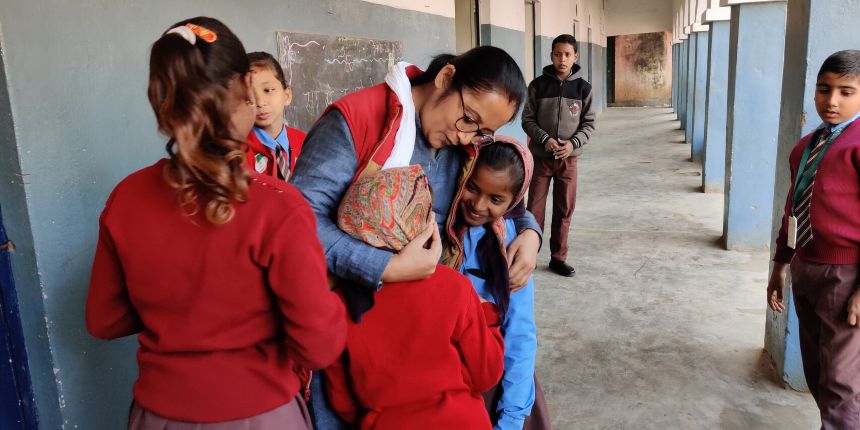‘Students lose trust’: How teacher transfers affect struggling pupils, school administration
Atul Krishna | July 6, 2024 | 05:34 PM IST | 4 mins read
Delhi’s Directorate of Education has transferred 5,000 senior teachers despite education minister Atishi being against it.

NEW DELHI: Dinesh Sharma*, a school teacher in South-West Delhi is one of the 50 Associate NCC Officers (ANO) appointed across Delhi Government schools. Sharma, who was given special training for the National Cadet Corps (NCC), has now been transferred to a school without an NCC programme as part of the mandatory transfer of teachers who have worked over 10 years in one school.
Although Sharma, who taught at that South-West Delhi school for 11 years, is happy that he has been transferred to one closer to home, he laments that all his training has now gone to waste and the government will now need to spend on training another ANO officer.
“There is a clause in the circular that the ANOs will not be transferred. They should not be transferred because public money is used for training us for three months in Chennai or Gwalior. If you are transferring teachers so often then you’ll have to train new teachers…but still I got transferred,” said Sharma.
A few others like Sharma were transferred to schools that did not have NCC.“If there is a complaint against a teacher then transferring them is fine. But I don’t think it’s right to forcibly transfer teachers,” said Sharma.
On July 2, the Directorate of Education transferred as many as 5,000 senior teachers from the schools where they had been teaching to different ones. This was seen as the latest episode in the conflict between Delhi’s elected Aam Aadmi Party government and the centre-appointed lieutenant governor. Not only did the Government School Teachers’ Association (GSTA) oppose this, Delhi’s education minister, Atishi did too.
Teachers said that these transfers have uprooted the strong bonds that teachers have built with students that extends to character-development and career guidance, especially for those from difficult homes. Moreover, the move also affects school administration as senior teachers usually handle administrative duties and implementation of new policies.
Delhi Government and teacher transfer
On June 11, the Directorate of Education issued a circular which mandated that all teachers who have taught in a school for over 10 years should mandatorily apply for transfer. If the teachers did not apply, they would be transferred regardless. On July 1, Atishi termed the circular “anti-education” and asked the directorate to repeal the order. On July 2, however, 5,000 senior teachers received transfer orders.
Teachers say that this is going to have an effect on the teaching-learning process in the schools. As most of these experienced teachers have known the students for years, they tend to be better equipped to help them tackle issues than a newer teacher.
“There are students who come from such homes with diseases, with abuse, and other many different problems. We tackle these children differently. We don’t place stress on his studies, or completing homework, or getting good marks. We try to make sure that the student is comfortable, that he or she attends school regularly, then we focus on their education,” said an English teacher who was teaching in a South-West Delhi school for 10 years.
“If a new teacher comes in, she will say that the student is not doing homework, or is not studying. Eventually that teacher will also figure out the student but that will take time and the student will lose trust,” they added.
Additionally, students also feel comfortable opening up about themselves to teachers they have known for a while. Many teachers reported that students still reach out to them for career guidance even after they graduate.
According to experts, this teacher-student bond also helps develop students’ aptitude towards specific subjects. “Children don’t usually learn the subject, they learn from the teacher. They don’t usually like the subject, they like the teacher. And subsequently this like for the teacher develops into a like for the subject,” said a mentor teacher who has worked closely with the Delhi Government on several projects.
Moreover, teachers also feel more inclined to help students they have known for years. “Just yesterday, I saw teachers collecting money amongst themselves for a student who passed Class 12 and got admission into some engineering college but did not have the money to pay the fees. There are many instances like this. And this happens only because of the bond they have and not because of any other responsibility,” said the mentor teacher.
‘Disruptive intervention’
Academics have framed the transfer policy as a “disruptive intervention”, one that hinders, not enhances the academic atmosphere.
“Experienced teachers know the system well. This helps with the academic environment and learning of the students… Those teachers who have been in the system for a long time are handling other responsibilities apart from teaching the subject. Implementing policies in the system like the Laadli scheme, or Red Cross, is as important as the teaching-learning process. The senior teachers are well-versed in these charges that they can implement these duties while teaching the subject,” said PD Sharma of the Vice and Principals’ Association of Delhi.
To many, the policy shows how teachers are just seen just as a part of the bureaucratic system without any consideration for the teaching-learning process or academic atmosphere.
“The government sees teachers as a part of bureaucracy. So the teacher is left with two identities, one that of a teacher and the one that is the last strand in the web of bureaucracy [whose members] are moved here and there, as is deemed fit,” said the mentor teacher.
*Name changed
Follow us for the latest education news on colleges and universities, admission, courses, exams, research, education policies, study abroad and more..
To get in touch, write to us at news@careers360.com.